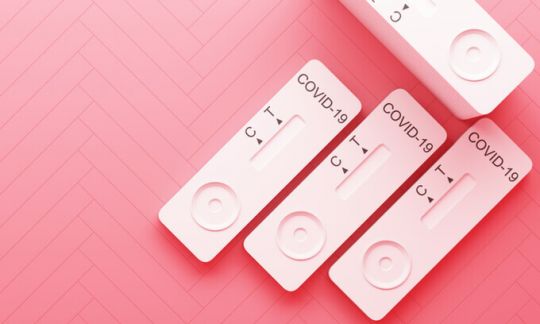How to claim RATs as a tax deduction

Wondering if you can claim rapid antigen tests, or RATs, as a tax deduction? In this article, Director of Tax Communications at H&R Block, Mark Chapman, explains how you may be able to claim some COVID-19 expenses, such as RATs, as a tax deduction.
Can you claim COVID-19 expenses as a tax deduction?
It may be possible for you to claim work-related COVID-19 expenses, including any costs you incur to take a rapid antigen or polymerase chain reaction (PCR) test, as well as some quarantine expenses, as tax deductions in your annual tax return.
Catching COVID-19 can be gruelling and inconvenient, and even the suspicion that you’ve caught it is stressful for many people. With RAT and PCR tests often expensive and hard to come by, it’s a small relief to know that many of the most commonly incurred expenses related to COVID-19 can be tax-deductible. In this guide, I share more about tax claims for COVID-19 expenses, on behalf of H&R Block.
Can you claim rapid antigen tests as a tax deduction?
The federal government recently announced plans to make COVID-19 tests tax-deductible for Australian individuals when they are purchased for work-related purposes. If passed, the legislation will be backdated to apply for the 2021/22 income year onwards (from July 1, 2021). But did you know these work-related tests are probably already deductible?
Under the existing general deduction rules, an individual may qualify for a tax deduction for the cost of a COVID-19 test (either PCR or RAT) where the test is taken for work-related purposes; for example, where there is a requirement under an employer’s COVID-19 mandate.
A COVID-19 test may also be required by certain countries and states in order for an employee to enter that territory or return to their home state. This, too, is tax deductible if the test is required for a work-related trip.
RAT kits purchased by individuals for private purposes (e.g. personal travel, convenience, no access to PCR testing) will not be tax deductible, either under existing law or under the government’s proposals. The Australian Taxation Office (ATO) also explains that only your costs are tax-deductible, so you can’t claim the cost of a test on your tax return if you didn’t have to pay for it.
Remember to keep all receipts relating to COVID-19 testing and take them with you when you get your tax return prepared, together with proof that the test was for work-related purposes.
If you incur transport expenses to get to and from the site of a COVID-19 PCR test (or expenses in traveling to the chemist or supermarket to acquire a RAT), these will generally not be tax-deductible, as they are regarded as private expenses, even if the test is a condition of your employment.
Is a rapid antigen test tax-deductible if your employer pays for it?
Where an employer spends money to provide RATs free of charge to employees, the cost should be a tax-deductible business expense to the employer, as the expense will be necessarily incurred in carrying on the business, since the employer has a duty of care to safeguard employees in their workplace.
There are no tax consequences for the employee. However, where a test is provided to an employee, or the cost reimbursed, a fringe benefits tax (FBT) liability may arise to the employer. That said, the government has indicated that such expenses will be made exempt from FBT from 1 July, 2021, once its proposed law changes I mentioned earlier have passed through Parliament.
Once again, however, the government’s work may already be done. As the ATO notes, COVID-19 tests (both PCR and RATs) are already potentially exempt from FBT as work-related medical screening, so no FBT is payable where both of the following apply:
- testing is carried out by a legally qualified medical practitioner or nurse, and
- testing is available to all employees.
If only some of the employees get COVID-19 tests, the tests are still exempt as long as they are offered to all employees.
If the tests do not meet these requirements, FBT may arise unless the minor benefits exemption or the ‘otherwise deductible rule’ applies.
The minor benefit exemption will only apply where the tests are provided infrequently and irregularly, and the cumulative value of the tests provided to an employee during the relevant FBT year (i.e the year ending 31 March) is less than $300.
The ‘otherwise deductible rule’ will apply to reduce the taxable value of COVID-19 tests that are taken because an employee is travelling on work, provided the test is required:
- by the destination jurisdiction or state, or
- for the employee to return to Australia or their home state or territory.
In other words, the ‘otherwise deductible rule’ only applies where the employee would have been able to claim a tax deduction for the cost of the COVID-19 test, had they purchased it themselves.
Quarantine expenses
If you must quarantine either during or after a work trip, any of your costs that relate to the quarantine (e.g. hotel fees, meals) would be tax deductible as the quarantine is undertaken as part of your employment duties.
If your travel is not for work, quarantine expenses are private in nature and not deductible.
A deduction for quarantine expenses also cannot be claimed in the following circumstances:
- fly-in, fly-out employees who travel to a regular work site but are not under the supervision and control of their employers while in transit
- where the need to quarantine is for a private purpose (e.g. returning from a private holiday).
Are quarantine expenses tax-deductible if the employer pays?
Where the cost of quarantine is covered by the employer, there will be no FBT liability, provided the employee was travelling for work. FBT is not payable where an employer provides emergency accommodation, food, transport or other assistance to an employee if:
- the benefit is emergency assistance to provide immediate relief, and
- the employee is, or is at risk of being, adversely affected by COVID-19.
In the context of COVID-19, this includes benefits provided that allow an employee to self-isolate or quarantine.
→ Related: Visit Canstar’s Tax Hub
Main image source: Jokiewalker/Shutterstock.com.
 About Mark Chapman
About Mark Chapman
Mark Chapman is Director of Tax Communications at H&R Block and is a regular commentator on tax matters for a variety of Australian broadcast and print media outlets, including Money Magazine, My Business magazine, The Australian Financial Review, The Daily Telegraph, The Age and The Business Spectator. Mark is an author, Chartered Accountant, CPA and Chartered Tax Adviser and holds a Masters of Tax Law from the University of New South Wales. Follow him on LinkedIn.
This article was reviewed by our Sub Editor Jacqueline Belesky and Sub Editor Tom Letts before it was updated, as part of our fact-checking process.






